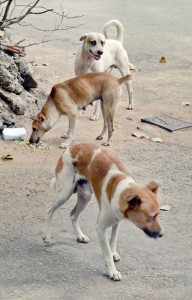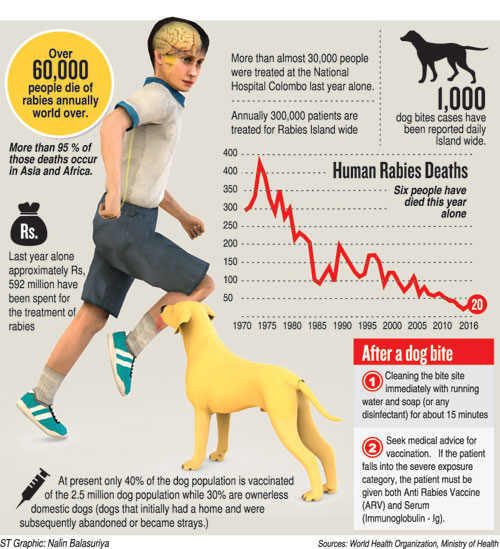News
Dog-bite cases soar to record levels

More than 95 per cent of rabies cases reported are as a result of dog bites
Amid efforts to control rabies, reports of dog bites have risen to a record 1,000 every day across Sri Lanka, a senior official of the Health Ministry said.
According to ministry data, every year 300,000 people are treated for rabies in the country, while 30,000 people were treated at the National Hospital Colombo last year alone.
The World Health Organisation estimates that almost 60,000 people die of rabies every year, with more than 95 per cent of those deaths occurring in Asia and Africa.
More than 95 per cent of rabies cases reported are as a result of dog bites, while cats, squirrels, and others account for the remainder.
According to health officials, compared with last year’s death toll, this year fatalities have increased.
Six deaths have been reported in the past three-and-a-half months, while last year there were 20 deaths from rabies.
Last year alone, Rs 592 million was spent on the treatment of rabies. This includes Rs 30 million for the rabies vaccine, Rs 169 million for sterilisation, and Rs 393 million for human treatments, acting director in Public Veterinary Services under the Ministry of Health, Dr. Ruwini Pimburage said.
Authorities were working towards immunising 75 per cent of the dog population as well as developing immunity to rabies within the population. The dog sterilisation programme was done with the help of district and regional health officials, local government health officials along with regional epidemiology unit officials.
Irresponsible pet ownership is seen as the main reason for the rise in rabies.
According to official statistics, Gampaha and Galle districts have recorded the highest number of rabies cases.
Colombo National Hospital Deputy Director Dr. Cyril de Silva explained that, the expensive human anti-rabies serum is only given if there was confirmation that the patient has been bitten by a rabid dog or had bite wounds that cut into veins and nerve-endings in the upper part of the body.
In a survey by the Colombo Municipal Council, it was found that there was a large dog population in Borella, Mattakkuliya and Dematagoda in markets and temples. 
The Chief Municipal Veterinary Surgeon of Colombo Dr. Vipula Dharmawardene, said pups are abandoned in luggage compartments in trains and also on the streets. This poses health and safety risks.
People in rural areas tend to use traditional methods to treat dog-bites before seeking hospital treatment. “People also cover the wound by tying a cloth around it, which is wrong. The wound needs to be kept open as covering it can facilitate the spread of infection,” Dr Dharmawardene said.
Dr. Chamith Nanayakkara of the Association of Veterinarians for Humane Management of Animal Population, said that laws should be introduced to punish irresponsible pet owners and persons who abandon pups on the streets.
“At present only 40 percent of the 2.5 million dog population is vaccinated, while 30 per cent are ownerless domestic dogs [dogs that initially had a home and were subsequently abandoned or went astray].’’
Dr. Nanayakkara also said: “People dump unwanted pups in temples, hospitals, schools, police stations and other public areas. The dogs are fed but only a few bother to sterilise or neuter them. This is a growing menace.”
According to a recent study by the Association of Veterinarians for Humane Management of Animal Population, only 70 per cent of the people in Sri Lanka have ever heard of rabies, the rest do know about the need to wash the wounds after an attack.
Dr Nanayakkara added that rabies awareness programmes should be undertaken in schools and on a community level.
Former Director of Public Health Veterinary Services Dr. P.A.L Harischandra said an anti-rabies biscuit could help. Although the efficacy depends on how much of the biscuit is consumed by a dog, it provides some protection for animals that have not been immunised.

